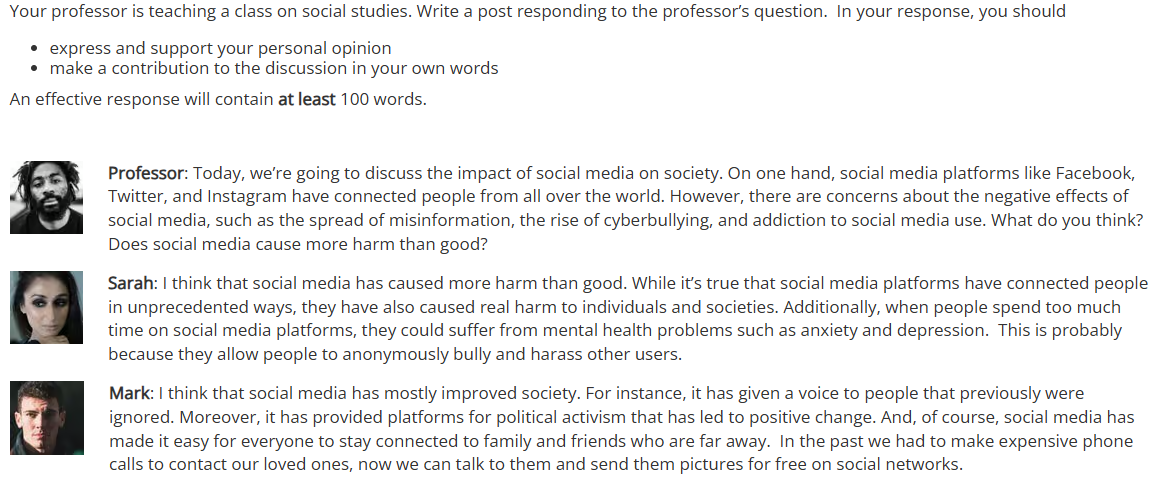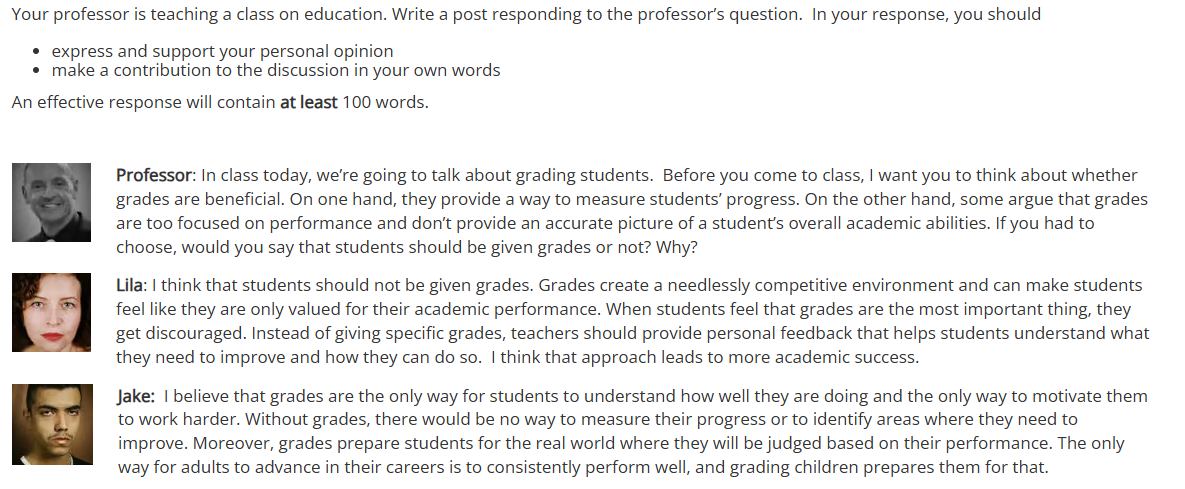Akademske diskusije

The professor is teaching a class on business.
Respond to the professor’s question using the professor's post and the posts by two other students. You should express and support your opinion and add new information to the discussion.
Professor: As I briefly mentioned in class last week, starting a small business involves both risks and rewards. So, let’s explore this topic a little more. Before we meet again next week, I would like to have your responses to this question: If you were offered a position with a large company and also an opportunity to start your own business, which would you choose to do? Why?
Jack: I would definitely prefer employment in a large company because it would provide a regular salary and benefits like health insurance and retirement options. And I would have more regular hours. Starting a business would be more than I would want to take on, especially at this stage of my career.
Emily: I’ve always been more of a risk-taker, so the idea of starting a business appeals to me. Once the business was off the ground, it would offer more potential for a higher income as well. I’m not afraid to work hard and I really like to be able to make my own decisions, which I would be able to do as an owner.
Your response: |
Your professor is teaching a class on computer science.
You should express and support your opinion and add new information to the discussion.
Professor: A new story about Artificial Intelligence (AI) is in the news almost every day. And, of course, companies are spending an enormous amount of money to develop new technologies related to AI. Before next class, I want you to consider the following question: Is AI a dangerous technology that, overall, will be harmful to society, or is it a powerful tool that will improve the lives of people?
Megan: Personally, I think AI is a threat. As AI advances, many jobs may become automated, leaving people without work. That will certainly increase income inequality. Additionally, there’s the risk that AI systems could be programmed with biases or used to discriminate against certain groups. We need to be careful and ensure that AI is developed in an ethical and responsible way. Since we can’t guarantee that right now, I think it is best to slow down.
David: I disagree with Megan. I’m of the opinion that AI has the potential to solve many of the world’s problems, from climate change to disease. Additionally, AI can help us make better decisions by analyzing vast amounts of data and identifying patterns that humans may miss. That said, I agree with Megan that we must ensure that AI is developed and used in a responsible way that benefits society as a whole.
Your response: |
The professor is teaching a class on science.
In your response, you should do the following. Express and support your opinion. Make a contribution to the discussion in your own words.
Professor: This week, we’ll be discussing the intriguing concept of space colonization. As technology advances and the Earth faces increasing environmental and resource challenges, some scientists propose establishing human settlements on other planets or moons. For example, Mars and the moon are considered viable options due to their relative proximity to Earth. Considering this, do you think space colonization is a feasible solution for humanity’s future? Why or why not?
Ethan: I believe space colonization is a necessary step for humanity. Given the Earth’s limited resources and the ongoing environmental degradation, establishing colonies on other planets could serve as a vital backup. It’s an ambitious plan, but with the right technology and international cooperation, it could secure the future of human civilization.
Olivia: While I understand Olivia’s points, I’m skeptical about the feasibility of space colonization. The costs and technological challenges are immense, and the ethical implications of terraforming another planet are complex. Instead of looking to space, we should focus on sustainable solutions on Earth to address our environmental and resource issues.
| Your response: |
Your professor is teaching a class on education.
Write a post responding to the professor’s question. In your response, you should express and support your personal opinion make a contribution to the discussion in your own words
Professor: In class today, we’re going to talk about grading students. Before you come to class, I want you to think about whether grades are beneficial. On one hand, they provide a way to measure students’ progress. On the other hand, some argue that grades are too focused on performance and don’t provide an accurate picture of a student’s overall academic abilities. If you had to choose, would you say that students should be given grades or not? Why?
Lila: I think that students should not be given grades. Grades create a needlessly competitive environment and can make students feel like they are only valued for their academic performance. When students feel that grades are the most important thing, they get discouraged. Instead of giving specific grades, teachers should provide personal feedback that helps students understand what they need to improve and how they can do so. I think that approach leads to more academic success.
Jake: I believe that grades are the only way for students to understand how well they are doing and the only way to motivate them to work harder. Without grades, there would be no way to measure their progress or to identify areas where they need to improve. Moreover, grades prepare students for the real world where they will be judged based on their performance. The only way for adults to advance in their careers is to consistently perform well, and grading children prepares them for that.
Your response: |
Your professor is teaching a class on political science
Make a post responding to the professor’s question. In your response, you should express and support your personal opinion make a contribution to the discussion in your own words
Professor: As you know, governments have a responsibility to improve the lives of residents. In today’s class we’re going to discuss the best way for them to do that. What strategy do you think governments should use to improve the overall quality of life of residents? Why do you think it’s important?
Maria: I think investing in transportation should be the main priority for every local government. This could include things like repairing roads and bridges, expanding bus and train services, and even building bike lanes. When cities have good infrastructure it’s easier for residents to get around, and new businesses come to town.
Tom: While I agree that infrastructure is important, I think that social programs should also be a major focus. The government could invest in things like education, affordable housing, and healthcare. All of these sorts of programs can help address issues like poverty, inequality, and access to basic needs. By providing these types of services, the government can help improve people’s well-being.
Sample Answer
In my opinion, the government should help people by providing more funding for education. I don’t just mean that they should spend more on schools. In fact, I think that they should also spend money on adult education. Nowadays, a lot of people have a hard time finding regular employment, but if they have access to training and programs that improve their skills they might have more success in the job market. Cities with higher employment rates have happier people and lower crime rates, so I think this approach is a wise one. Although it’s true that governments already spend a lot on education, I think investing even more in this area will help a wide range of citizens.
Your answer: |
Your professor is teaching a class on business management.
You should make post responding to the professor’s question. In your response, you should express and support your personal opinion make a contribution to the discussion in your own words
Professor: Today, we’re going to talk about the benefits and drawbacks of remote work. Many companies have implemented remote work policies in the past few years, and many others are considering joining them. Given that this represents a major change in the way we work and interact with each other, companies must carefully consider all relevant details before making a decision. What do you think? Is remote work beneficial, or do you think it’s a bad idea?
Sara: I think remote work is a very positive trend. When we work from home, we spend less time commuting and we have more flexible schedules. Plus, many people find that they are more productive when working from home. Some people say this is because they aren’t distracted by their coworkers, while others suggest it’s because their energy isn’t drained during a long and bothersome commute.
Michael: While I can see the benefits of remote work, I don’t think it should become the new normal. There’s something to be said for the atmosphere that comes from being in the same physical space as your colleagues. I also think that remote work can make it harder to build relationships and collaborate effectively. This means it might limit our chances to earn promotions and raises. And what about people who don’t have enough room for a home office? They’ll suffer if this trend continues
Sample Answer 1
While a lot of people favor traditional workplace arrangements, I really think that letting employees work from home is a fantastic idea which more companies should consider. Most of us just feel much more comfortable when we are in our own house, and that makes it possible for us to think more creatively about our assignments. Nowadays, employers value creativity above all else, so this option is probably best for everyone. While communicating with people in person can certainly inspire us to think about things from new perspectives, so can talking to people via social networks. Actually, the ability to quickly share links to relevant articles sometimes leads to even greater inspiration and more rapid progress on work projects.
Sample Answer 2
While Ronald has raised some relevant points, I think that remote work is harmful. When we work from home, we don’t have many opportunities to directly interact with our supervisors. Consequently, we are likely to be overlooked when promotions are offered to employees. Remember that company managers only promote people they have very close personal connections with, and such relationships cannot be established through e-mail. Since almost everyone wants to advance in their careers and make more money, I think it’s a smart idea to give up remote work and return to our offices. It’s also important to keep in mind that spending time with our colleagues can improve our mental health. That’s because socializing with people outside of our family is a good way to release stress.
Your professor is teaching a class on education
In your response, you should:
- express and support your personal opinion
- make a contribution to the discussion in your own words
Professor: Over the next few weeks, we’re going to talk about recent trends in education. Specifically, we’ll discuss how many universities have started letting students take classes from home instead of taking them in person on campus. I want to know what you think about this issue, so here’s a quick question for the discussion board: “What do you think is the most significant impact of online classes? Why do you think it has this impact?”
Jack: The main thing is that online classes make education more accessible. For one, they help reduce commuting time and costs and give students more flexibility in their schedules. Plus, online learning can be more accessible for students who have disabilities or live far away from campus. Traditionally, high costs have prevented many people from pursuing an education, but thanks to online classes cost is less of a problem.
Emily: I think that online classes cause people to learn less than before. There’s something to be said for the energy and engagement that comes from being in the same physical space as your classmates and instructor. Moreover, when we take classes in person it is easier to build relationships and collaborate. We learn just as much from personal connections as we do from our actual lectures and textbooks.
Sample Answer
While there are certainly some advantages of online learning, I think its biggest impact is that it makes people more likely to cheat on their assignments. When we study on campus, we can easily access resources like an academic library or a science lab. We can even schedule meetings with our professors or other experts who work on campus. That means it is easier to complete our assignments all by ourselves. In contrast, when we study entirely at home it can be difficult to access beneficial resources. Consequently, some people might feel that they have no choice but to plagiarize content online, or use AI to complete their essays. Honestly, I think people who study at home do this just to keep up with their peers on campus.
Your professor is teaching a class on social studies.
In your response, you should
- express and support your personal opinion
- make a contribution to the discussion in your own words
Professor: Life expectancies are increasing all over the world nowadays. Some of you probably know someone who is more than 100 years old. Before our next class, I want you to consider the following question: What factors do you think have contributed to the increase in life expectancy? Is it due to advances in medical technology, improvements in government services, changes in lifestyle habits, or something else entirely?
Lisa: I think the main reason why people are living longer nowadays is recent advances in medical technology. Modern medicine has enabled us to better treat and manage chronic illnesses, and there have been major breakthroughs in areas such as cancer treatment and organ transplantation. As a result, people are able to live longer with diseases that may have been fatal in the past. Not only that, but they can live more rewarding and fulfilling lives.
John: While medical technology has certainly played a role, I think improvements in government services have been just as important. We now have access to clean drinking water, sanitation systems, and free vaccines that have dramatically reduced health problems. In the past, people didn’t have access to any of these things. Additionally, public health campaigns have helped educate people about healthy habits such as exercise, healthy eating, and about the danger of smoking.
Sample Answer 1
In my opinion, new scientific discoveries are the main reason we live longer nowadays. New technology also makes it a lot easier for doctors to deliver those treatments. In many cases, doctors can assist patients over the Internet, even from miles away. That wasn’t possible when my parents were young. Back then, the average life expectancy was much lower than it is now. It’s certainly true that public campaigns about healthy eating and exercise have improved our lives, but people actually have less healthy diets and get less exercise than they did in the past. Despite that, they still live longer lives. For example, although children are less likely to have physical education classes or play outside nowadays, they still suffer from fewer diseases than in the past.
Sample Answer 2
A lot of things impact how long we live, but I’m fairly sure that our longevity is mainly due to improved government services. In the past, it was normal for people to go decades without getting a regular checkup, but nowadays local authorities encourage people to get checked out by a doctor on an annual basis. While individuals are certainly more likely to be diagnosed with life-threatening diseases nowadays, early detection means that they are also more likely to be cured. I think health care services like this will continue to be well-funded in the future, so our life spans might get even longer.
Your professor is teaching a class on marketing.
In your response, you should:
- express and support your personal opinion
- make a contribution to the discussion in your own words
Professor: Hello class! Next week we will be discussing the impact of social media influencers on consumer behavior. With the rise of social media platforms like Instagram and YouTube, we’ve seen the emergence of a new type of celebrity: the social media influencer. These influencers have large followings and can sway consumer behavior by endorsing products or services. What are your thoughts on this?
Jack: I think social media influencers have a significant impact. When young people start admiring these influencers and trust their recommendations, they are more likely to buy products or services that they endorse. However, I also think there are some concerns about the authenticity of these endorsements, as some influencers may promote products that they don’t actually use or believe in.
Emily: I’m not convinced that social media influencers have a significant impact on consumer behavior. While they may have large followings, most people are smart enough to make their own purchasing decisions based on their needs and preferences. Plus, there are so many influencers out there promoting different products that it can be hard to know who to trust.
Sample Answer 1
In my opinion, social media influencers aren’t as significant as some people suggest. I agree with Emily’s idea that people are too smart to be influenced by them. I’d add that twenty years ago a charismatic person might have convinced us to buy something we didn’t really need, but I think that doesn’t happen so much nowadays. That’s because we can thoroughly research whatever products we are interested in using blogs, consumer magazines and social media. Since we can use these sources of information to find goods that exactly suit our needs, we aren’t swayed by the exaggerated claims of social media influencers. Jack raised the relevant point that young people are especially vulnerable, but I think most parents these days take the time to educate their kids about misinformation and monitor their internet use. As a result, young people aren’t likely to make rash decisions about what to buy.
Sample Answer 2
While I appreciate the points mentioned by Jack and Emily, I think that social media stars aren’t particularly influential nowadays. Nowadays consumer behavior is affected by many different things, not just what we see on the Internet. Twenty years ago a charismatic person might have convinced us to buy something we didn’t really need, but I don’t think that happens so often today. Remember that the choices people make are also impacted by their peers, by their family members and even by traditional advertising, so the Internet isn’t a dominant force in their lives. Some people may feel that influencers are more powerful than ever, but I think their impact is actually declining
Your professor is teaching a class on education.
In your response, you should
- express and support your personal opinion
- make a contribution to the discussion in your own words
Professor: In next week’s class we’ll talk about different approaches to education. You know, not everyone agrees about the best way for young people to gain knowledge and learn new skills. Let’s prepare by discussing whether it’s better for students to take classes with a lot of discussions or classes mainly focused on lectures. What do you think?
Rachel: I prefer classes that have a lot of discussions. I just learn better when I’m actively engaged with academic material and can exchange ideas with my classmates. When I have the opportunity to get immediate feedback, I can understand things more deeply. I also benefit from hearing about different perspectives and new ways of thinking about challenging topics. Additionally, discussions help me retain the information better since they’re more interactive and memorable.
Mike: I see your point, Rachel, but I prefer lectures. I like being able to listen to an expert explain a topic and really get into it. With lectures, there’s usually a clear structure and a set agenda, which can help me stay focused and organized. I also appreciate being able to take notes and study at my own pace. I can’t do those things if I have to engage in a discussion. Not only that, but discussions can sometimes get off track or become too argumentative, which can take away from the learning experience.
| Sample Answer 1 | Sample Answer 2 | |
In my opinion, interactive classes are much better than ones where we just sit and passively listen to a professor. I strongly agree with Mike’s perspective, and I’d add that we need to prepare for discussions in advance, which also improves our retention of specific details and concepts. When we have a deeper understanding of academic topics, we get higher grades on tests and assignments. While Rachel is right about the fact that it is hard to stay focused while a conversation is going on, it is extremely easy to record our classes. If we need to refer back to things that were mentioned in a class, we can just listen to a recording of it. | Both options have real advantages, but I’m convinced that interactive classes are much better than ones where we just sit and passively listen to a professor. Discussions require a certain amount of preparation, so they encourage learners to do plenty of pre-reading before coming to class. Whenever we prepare for a topic in advance, we increase our likelihood of retaining memories of specific details and concepts. Remember that people who are able to master challenging academic topics get higher grades on tests and assignments. It’s also worth mentioning that nowadays it’s really easy to record our classes, so we can create a record to refer to later in case we forget something that was brought up by a classmate or professor. Overall, I’d say that spirited discussions create a stimulating academic environment that everyone can benefit from. |
Your professor is teaching a class on sociology.
In your response, you should
- express and support your personal opinion
- make a contribution to the discussion in your own words
Professor: Lately we’ve talked a lot about the impact of technology on our lives. With the prevalence of smartphones and other devices, we’re more connected than ever, but some people are distressed by this trend. We’ll discuss this in our next class, but before we do I’d like to hear your thoughts on the issue. Overall, do devices like smartphones have a positive impact on the way we communicate? Or a negative one?
Rachel: This sort of technology has had a negative impact on our ability to communicate face-to-face. People are too reliant on text messages and social media, and that reduces the nuance and depth in our interactions. It’s harder to read body language and tone of voice over text, and that can result in misunderstandings. If people want to become effective communicators, they should talk to people in person.
Mike: While I agree that it can sometimes be challenging to communicate in person, I also believe that modern technology is beneficial. Smartphones make it possible for us to stay connected with acquaintances and loved ones who are far away, and social networks provide a platform for introverted people to express themselves in ways that they may not be able to do in person.
Sample Answer 1
In my opinion, having a smartphone is advantageous in the modern world. Certain groups of people just aren’t able to share their ideas in traditional media like newspapers and television broadcasts, but if they have smartphones they can easily share whatever is on their mind by posting to social networks like Twitter and Facebook. When people are able to share how they feel about political and sociological issues, they can bring about positive change in society. Think about the last election in our country. People were really upset about the policies of the Red Party, so they flooded social media with complaints and encouraged people to vote for the Blue Party. I think those posts had a profound impact on the final result.
Sample Answer 2
While I can see where Mike is coming from, I am convinced that smartphones have a really detrimental impact on communication in the modern world. People everywhere have become obsessed with watching short videos and reading social media posts when they have some time to kill, so their attention spans are almost non-existent. This means they have a hard time interacting with each other for long periods of time. When my parents were young, they spent their free time reading newspapers and books. I think that improved their overall academic abilities, so when they went to college they were able concentrate on things for hours at a time, including conversations. In contrast, I get pretty anxious when I have to talk to someone and am unable to look at my phone every five minutes
Your professor is teaching a class on public administration.
In your response, you should
- express and support your personal opinion
- make a contribution to the discussion in your own words
Professor: Funding for education is a really hot topic nowadays, so today we’re going to talk about how universities use their limited resources. In the discussion board please respond to the following question: Should universities prioritize funding academic facilities like libraries, or is it okay to spend just as much money on sports and athletic programs?
Rachel: I think universities should prioritize funding for libraries. Libraries are essential for academic research, and they provide students with access to information and resources that they might not have otherwise. Investing in libraries can also help attract and retain the most talented professors, which can ultimately benefit the university as a whole. Sports, on the other hand, appeal to just a few people.
Mike: While I agree that libraries are important, I think that sports programs should also be a priority for universities. Sports can bring the campus community together, even if that just means they attend sports and cheer for their favorite athletes. Meanwhile, among the athletes themselves, sports promote teamwork and leadership skills. Additionally, successful sports programs can generate revenue for the university and boost its reputation.
Sample answer 1
In my opinion, universities should spend more money on academic facilities. I’m convinced that they also help schools recruit the best possible students, which improves their whole academic environment. Everyone enjoys classes a lot when their classmates are intelligent and devoted to their studies, so this seems like an obvious choice to make. Mike raised the relevant point that athletic events bring people close together, but he didn’t mention that there are other ways to do that which are much more affordable. For example, organizing a campus festival is a more cost-effective way to help students bond than funding an entire football team.
Sample answer 2
While Rachel brought up a few great points, I still believe that it is worthwhile to fund athletics. Remember that most universities in this country are pretty much the same in terms of classes and professors, but a winning sports team can help a school stand out from the crowd. Many high school students pick their university based on the success of its sports teams, so it is probably a smart idea to make sure those teams get enough funding. I certainly agree that libraries are ultimately more important than football stadiums, but when enrollment goes up there will be more money for libraries and other academic facilities.
Science

you:
Economy and Business

you:
Social studies

you:
Education

you:
Political science
Question Styles
Sometimes the question requires you to state a preference between two similar things.
Other times, you are asked a “yes or no” question.
Finally, you might be asked something totally open-ended.